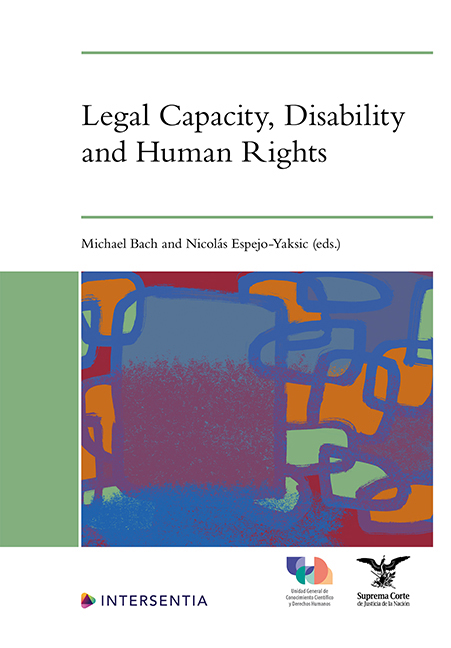Book contents
- Frontmatter
- Foreword
- Acknowledgements
- Contents
- List of Cases
- List of Contributors
- Legal Capacity, Disability and Human Rights: Introduction
- PART I HISTORICAL PERSPECTIVES AND THEORETICAL FRAMES
- PART II LAW REFORM: COUNTRY AND REGIONAL PERSPECTIVES
- PART III LEGAL QUESTIONS, PERSISTENT CHALLENGES
- Index
- About the Editors
Evaluating the Induction of Article 12 Jurisprudence in Indian Law: Is Half a Loaf Better?
Published online by Cambridge University Press: 03 April 2024
- Frontmatter
- Foreword
- Acknowledgements
- Contents
- List of Cases
- List of Contributors
- Legal Capacity, Disability and Human Rights: Introduction
- PART I HISTORICAL PERSPECTIVES AND THEORETICAL FRAMES
- PART II LAW REFORM: COUNTRY AND REGIONAL PERSPECTIVES
- PART III LEGAL QUESTIONS, PERSISTENT CHALLENGES
- Index
- About the Editors
Summary
INTRODUCTION
All advocates for change have to battle with dilemmas on the pace and process of the change that is being demanded. Should it be gradual or radical? Is it acceptable to make concessions and carry everyone along or should an inflexible stance be adopted as every concession would only prolong the rule of the old and provide the semblance of change only? Robert Caro in his biography on Robert Moses has a telling paragraph documenting the impatience of a leading politician with idealism and the idealist's inability to compromise. Such people, the politician bemoans, “were willing to devote their lives to fighting for principle and wanted to make that fight with out compromise or surrender of any part of the ideals with which they had started it”, even if the unwillingness to compromise causes real losses to those for whose mission they battle. The paragraph made me wonder, can idealists only be categorised as inflexible impediments? Also, if change is being visualised, is it enough only to agonise on the substance of the change, or is it also important to reflect on how the change should be executed?
Article 12 of the United Nations Convention on the Rights of Persons with Disabilities (hereinafter CRPD) has often been referred to as effecting a paradigm shiftin the legal understanding of legal capacity by recognising that all persons with disabilities possessed it and the accessing of support to exercise legal capacity in no way negated the existence of capacity. I have elsewhere recounted the ebb and flow accompanying the adoption of this article in the United Nations. Since India follows the dualist system of international law, the Convention becomes part of Indian law only after the enactment of domestic legislation. This chapter will analyse: the seven year-long process of inducting Article 12 into Indian law; the tension between the demands made by various stakeholders at different points in time and the final text adopted by the legislature.
- Type
- Chapter
- Information
- Legal Capacity, Disability and Human Rights , pp. 221 - 236Publisher: IntersentiaPrint publication year: 2023



